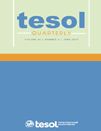
TESOL QUARTERLY
Scope & Guideline
Transforming Language Education with Groundbreaking Studies
Introduction
Aims and Scopes
- Multilingual and Translingual Pedagogy:
Explores teaching strategies that incorporate the linguistic and cultural backgrounds of learners, emphasizing the importance of translingual practices in diverse educational settings. - Digital and Technological Integration in Language Learning:
Focuses on the impact of digital tools and technologies on English language teaching, including the use of AI, digital storytelling, and online learning platforms. - Critical Pedagogy and Social Justice:
Investigates the intersections of language education with issues of equity, race, gender, and identity, promoting inclusive practices that address systemic inequalities in language learning. - Teacher Identity and Professional Development:
Examines the evolving identities of language teachers, including their emotional experiences, reflective practices, and the challenges they face in diverse educational contexts. - Assessment and Language Proficiency:
Analyzes various assessment practices and their implications for learners' language development, focusing on formative and summative assessments that support multilingual learners. - Sociocultural Perspectives on Language Learning:
Utilizes sociocultural theories to understand how learners interact with language in their social contexts, emphasizing the role of community and collaboration in language acquisition.
Trending and Emerging
- Emotional Labor and Teacher Well-Being:
Research increasingly focuses on the emotional experiences of language teachers, exploring how emotional labor impacts their professional identities and overall well-being. - Global Englishes and Decolonization:
There is a growing emphasis on understanding the implications of global Englishes and decolonizing English language teaching practices to better serve diverse learner populations. - Equity and Inclusion in Language Education:
Emerging studies address issues of equity and inclusion, with a strong focus on the experiences of marginalized groups and the necessity for culturally responsive pedagogies. - AI and Technology in Language Learning:
The integration of artificial intelligence and digital tools in language education is a rapidly expanding area, examining both the pedagogical implications and ethical considerations of technology use. - Collaborative and Community-Based Learning:
Research is trending towards collaborative learning experiences that engage students in community contexts, promoting authentic language use and social connections. - Translingual Practices and Multilingualism:
An increasing number of studies are exploring translingual practices, emphasizing how multilingual learners navigate their languages in various contexts and the pedagogical strategies that support this.
Declining or Waning
- Traditional Language Teaching Methods:
There has been a noticeable decrease in research centered on conventional grammar-focused teaching methods, as the field increasingly values communicative and contextual approaches. - Native Speaker Norms and Standards:
Research that prioritizes native speaker models of language proficiency is less prevalent, reflecting a growing acceptance of diverse Englishes and the need for inclusive practices. - Standardized Testing Practices:
The focus on traditional standardized testing methods is declining, as educators and researchers explore more holistic and formative assessment strategies that cater to diverse learner needs. - Monolingualism in Language Education:
Interest in monolingual teaching contexts is waning, with a shift towards embracing bilingualism and multilingualism as central to effective language pedagogy.
Similar Journals

Journal of Research in Applied Linguistics
Advancing Knowledge in Applied LinguisticsJournal of Research in Applied Linguistics is an esteemed academic journal published by Shahid Chamran University Ahvaz, Iran, focusing on the dynamic field of linguistics and language studies. With an ISSN of 2345-3303 and an E-ISSN of 2588-3887, the journal has established itself as a valuable resource for researchers and professionals aiming to explore diverse issues related to applied linguistics, including language acquisition, pedagogy, and sociolinguistic interactions. As part of a robust academic community since its inception in 2017, it is recognized with a Q2 quartile ranking in the world of linguistics and achieved impressive Scopus ranks reflective of its growing impact, particularly within the arts and humanities. The journal embraces an open access policy, enhancing its reach and availability to a broad audience. Researchers, educators, and students alike will find in the Journal of Research in Applied Linguistics a critical platform for dialogue, innovation, and contribution to the evolving landscape of language research.

TESL Canada Journal
Advancing ESL Education Through Innovative ResearchTESL Canada Journal, published by TESL Canada, serves as a vital resource for researchers, educators, and practitioners in the field of English as a Second Language (ESL) and applied linguistics. With its commitment to advancing scholarship and best practices in language education, this esteemed journal fosters a platform for the dissemination of high-quality research and innovative pedagogical approaches. Although it operates without open access, its comprehensive articles and reviews offer valuable insights into current trends and challenges faced by ESL educators across Canada and internationally. The journal is dedicated to promoting a deeper understanding of language acquisition processes and instructional methodologies, contributing significantly to the professional development of its readership. Located in Burnaby, Canada, the journal aims to bridge the gap between theory and practice, making it an indispensable source for educators and researchers looking to enhance their expertise in ESL education.
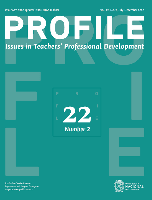
Profile-Issues in Teachers Professional Development
Navigating Change: Essential Research for Educators' GrowthProfile - Issues in Teachers Professional Development is a distinguished open access journal published by the Universidad Nacional de Colombia, Facultad Ciencias Humanas, aimed at fostering research and discourse surrounding critical issues in educators' ongoing professional development. Since its inception in 2005, the journal has established itself as a significant resource within the fields of Education and Linguistics and Language, reflecting its relevance through its category quartiles, being positioned in Q3 in Education and an impressive Q1 in Linguistics and Language for 2023. The journal boasts a commendable Scopus ranking, reflecting its impact and commitment to advancing scholarly discussion, with rankings of #236 out of 1167 in Linguistics and Language, and #818 out of 1543 in Education. With a converged timeline from 2018 to 2024, it serves as a vital platform for educators, researchers, and students alike, encouraging the dissemination of innovative practices and insights essential for the evolution of teacher training and professional growth in a rapidly changing educational landscape.
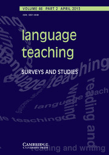
Language Teaching
Shaping the landscape of language education since 1969.Language Teaching, published by Cambridge University Press, is a premier peer-reviewed journal that has been at the forefront of the linguistics and language education field since its inception in 1969. With an impressive impact factor positioning it in the top tier (Q1) of its category, this journal is ranked 22nd among 1,088 in the Arts and Humanities field and maintains an outstanding 98th percentile ranking. Focusing on innovative research and methodologies in language teaching and learning, Language Teaching provides a vital platform for discussing the latest developments in pedagogy, applied linguistics, and curriculum design. Although it does not offer open access options, it reaches a broad audience of researchers, educators, and practitioners dedicated to enhancing language instruction across various contexts. The journal continues to evolve, with plans to cover emerging trends and challenges in language education until 2024, making it an essential resource for anyone invested in the teaching of languages.
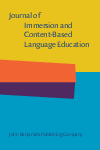
Journal of Immersion and Content-Based Language Education
Unlocking the Potential of Content-Based Language InstructionJournal of Immersion and Content-Based Language Education, published by JOHN BENJAMINS PUBLISHING CO, is a leading academic journal dedicated to the fascinating intersection of language education and immersive learning experiences. With its ISSN 2212-8433 and E-ISSN 2212-8441, the journal has carved a prominent niche in both the Education and Linguistics fields, earning a Q2 ranking in Education and a prestigious Q1 ranking in Linguistics, as noted in 2023. Situated in the Netherlands, this journal caters to a global audience, offering access to cutting-edge research and methodologies in content-based language instruction. Committed to fostering scholarly dialogue, the Journal of Immersion and Content-Based Language Education empowers researchers, educators, and students alike to explore innovative practices and theoretical frameworks. With a Scopus ranking reflecting its impact in the field—#196/1088 in Language and Linguistics at the 82nd percentile and #807/1543 in Education—this journal is a vital resource for those committed to enhancing linguistic education through immersive methodologies.
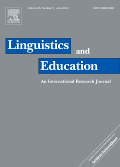
Linguistics and Education
Bridging Language and Learning for Future GenerationsLinguistics and Education, published by Elsevier, is a premier journal dedicated to advancing the understanding of the intersections between linguistics and educational practices. With its ISSN 0898-5898 and E-ISSN 1873-1864, this journal has established itself as a significant platform since its inception in 1988, continuing to produce impactful research up to 2024. It enjoys a prestigious Q1 ranking in both the Education and Linguistics and Language categories, reflecting its high-quality contributions and leading role in the field. The journal’s Scopus rankings further underscore its influence, being placed in the 87th percentile for Arts and Humanities in Language and Linguistics, and the 86th percentile in Social Sciences in Linguistics and Language. Although it operates under traditional subscription access, its contributions are essential for researchers, professionals, and students alike, making substantial strides in the understanding of language, learning environments, and pedagogical strategies. The journal's objective is to foster interdisciplinary dialogue and disseminate innovative research that informs educational policy and practice.

English Teaching and Learning
Exploring New Horizons in English Teaching MethodologiesEnglish Teaching and Learning is a distinguished academic journal published by SPRINGER SINGAPORE PTE LTD, focusing on the dynamic fields of education and linguistics. With an ISSN of 1023-7267 and an E-ISSN of 2522-8560, this journal serves as a vital platform for researchers, educators, and practitioners interested in advancing the understanding of English language instruction and learning methodologies. Recognized for its high standards, it has achieved a notable Q2 ranking in Education and a prestigious Q1 ranking in Linguistics and Language in 2023, underscoring its impact within these essential scholarly fields. The journal, which spans a converged publication period from 2015 to 2024, endeavors to disseminate innovative research, theoretical insights, and practical applications, making it an invaluable resource for anyone committed to enhancing English education globally. Although it does not operate under an open-access model, its contributions are pivotal in shaping contemporary discourse in English teaching and learning.

Journal of Teaching English for Specific and Academic Purposes
Empowering Educators, Elevating English.Journal of Teaching English for Specific and Academic Purposes, published by UNIV NIS, FAC SCI MATH, is a pivotal platform for researchers, educators, and practitioners in the field of language education, particularly focusing on specialized and academic English instruction. With an ISSN of 2334-9182 and an E-ISSN of 2334-9212, this journal serves as a conduit for innovative research and pedagogical advancements from 2019 to 2024, contributing significantly to the understanding of language teaching methodologies. As a recognized entity in the Q3 category of Education as per 2023 evaluations, it ranks #1071 in Scopus’s social sciences education realm, indicating its growing influence and relevance. Although it operates without open access, the journal aims to provide a comprehensive exploration of effective teaching strategies and academic practices, crucial for both current scholars and institutions. The journal welcomes diverse contributions that shed light on the evolving landscape of English language teaching, making it an essential resource for those striving to enhance their knowledge and practice in this important area.

AAA-ARBEITEN AUS ANGLISTIK UND AMERIKANISTIK
Enhancing Understanding of Linguistic and Literary PhenomenaAAA-ARBEITEN AUS ANGLISTIK UND AMERIKANISTIK, published by GUNTER NARR VERLAG, is a distinguished journal catering to the fields of Linguistics, Language, Literature, and Literary Theory. With its ISSN 0171-5410, this quarterly publication has been a vital resource for scholars since its inception in 2002 and is set to continue until 2024. Situated in Germany, it ranks in the Q3 category for Linguistics and Language and Q2 for Literature and Literary Theory as of 2023, indicating its significant contribution to these disciplines. Despite being non-open access, the journal is recognized for its scholarly rigor, boasting impressive Scopus ranks in both Arts and Humanities and Social Sciences, which underscores its relevance and impact. By fostering comprehensive discussions and analyses of English and American literature, as well as linguistic phenomena, AAA-ARBEITEN AUS ANGLISTIK UND AMERIKANISTIK serves as an essential platform for academics, professionals, and students aiming to deepen their understanding and research in these critical fields.

Taiwan Journal of TESOL
Exploring the Intersection of Language and CultureTaiwan Journal of TESOL, published by CRANE PUBL CO, serves as a vital platform for research in the fields of Education and Linguistics. Established to advance the field of Teaching English to Speakers of Other Languages, this journal provides a diverse range of scholarly articles aimed at enhancing pedagogical practices, understanding language acquisition, and facilitating cross-cultural communication. With a convergence of research years from 2017 to 2024, it proudly holds its position within the quartile rankings of Q4 in Education and Q2 in Linguistics and Language. The journal’s Scopus ranks notably place it in the 61st percentile for Language and Linguistics among Arts and Humanities, making it a respected resource for both seasoned scholars and emerging researchers. While it currently does not offer open access, the journal remains committed to making its contributions available to the academic community. The ISSN numbers are 1814-9448 and 2076-7617 for print and electronic formats, respectively, ensuring accessibility to a global audience. As a leading publication within its domain, the Taiwan Journal of TESOL invites submission of innovative research that shapes the future of language education.